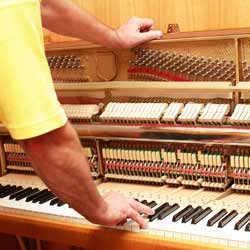Piano Tuner Jobs
Do you enjoy the beautiful music of pianists like Billy Joel, Gershwin, Mozart, Beethoven, or Elton John? Do you play the piano? Playing the piano is an incredible music talent that is enjoyed by all – unless the piano is out of tune. That’s when you need a piano tuner to come to the rescue.
Piano tuners tune acoustic pianos. By making minute adjustments to the parts of an acoustic piano, they can take an out of tune piano and perfect the pitch, tone, and sound so that it plays accurately. Piano tuning has been a profession since the 1800’s and it’s still a popular way to make a living.

Pianos are musical instruments that produce a magical sound by playing the keys on a keyboard. There are approximately 10 million pianos in the US. Grand and upright pianos from manufactures like Steinway & Sons, Yamaha, or Bosendorfer range in price from $1,000 to upwards of $30,000. Most manufacturers recommend that a piano is tuned four times per year. That will keep any piano tuner busy.
Piano technology is a complicated field. An average piano has 12,000 parts with 10,000 moving parts. It’s a piano tuner’s job to be familiar with how all of those parts function and interact so that they can troubleshoot, adjust, repair, replace, and renovate pianos to keep them in tune.
Piano tuners have to understand how pianos work. Typically, pianos have 88 keys (52 white and 36 black) that are attached to 220 strings. A single key tap creates a chain reaction where a padded hammer strikes a string that is under 160 pounds of tension. The string’s vibration is transmitted through a bridge and then amplified by a soundboard. When the key is released the vibration ends, as does the sound. This description is very basic, but essentially a piano is a musical machine that needs a trained piano tuner to take care of it.
It’s amazing how easily a piano can go out of tune. Humidity, weather, misuse, and even vibrations can cause issues. Soundboards swell. Strings stretch. Wood compresses. It all results in a undesirable, flat sound.
To fix the problem, piano tuners tweak hammers, adjust tension, replace wires, and fix countless other issues. This may include dismantling, rebuilding, or repairing various parts. Once one string is adjusted, every note must be assessed to ensure the entire piano is in tune. It’s a timely process that requires a good ear for proper tuning.
To learn about piano tuning, take online courses, find an apprenticeship, or attend training programs through universities or technical schools. Courses will cover topics like theory, tuning procedures, parts, functions, repairs, history, design, business, tone, pitches, sounds, and other piano technology topics. Find course listings and continuing education options via the Piano Technicians’ Guild (PTG).
After training, piano tuners can earn the Registered Piano Technician certification through the PTG. This certification includes exams on tuning, piano knowledge, parts, and repairs.
Once certified, piano tuners can find work with music stores, colleges and universities, concert venues, piano manufacturers, recording studios, or be self-employed. Many seek specialized training with specific piano manufacturers. Others choose to dabble in the retail side of the piano business.
A certified piano tuner will make between $100 and $185 per tune. This depends on their location, employer, experience, and other factors. A hot shot piano tuner for a big band on world tour will typically make more than a piano tuner making house calls.
If you have a musical ear, a passion for pianos, and you’re a fan of “tickling the ivories,” maybe you should become a piano tuner. It might be the perfect music career for you.
Quick Facts About Piano Tuner Jobs
Job Title: Piano Tuner aka Piano Technician
Office: Around Pianos
Description: Tune pianos
Certifications/Education: Registered Piano Technician certification
Necessary Skills: Musical background, Good ear, Finger dexterity
Potential Employers: Music shops, Universities, Concert Venues, Piano Manufacturers
Pay: $100-$185 per tune

